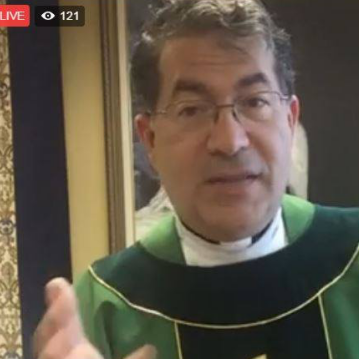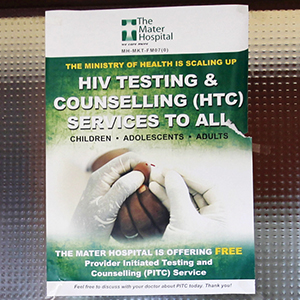In vanguard against HIV
Compassionate and non-judgmental health care delivered by the Catholic Church in Kenya has significantly helped reduce the HIV/AIDS burden, Bishop Paul Kariuki Njiru, the chairman of the Bishops’ Conference commission on AIDS relief, told faith-based organisations meeting in Nairobi on 3 November to review the way HIV/Aids is being tackled in the country. “While many actors and individuals preferred to deny the impact of HIV/AIDS or blame its victims, we opted to extend a helping hand as part of our healing ministries,” the bishop told the gathering.
He said the Church offered clinical care, as well as public awareness teaching on ending stigma and discrimination. With a population of 44 million, Kenya has an HIV prevalence of 6 per cent, or 1.5 million people living with the virus.
Peace award in Pakistan
The National Commission for Justice and Peace of the Catholic Bishops’ Conference of Pakistan and the Human Rights Commission of Pakistan have been awarded the 2016 Pax Christi International Peace Award. Pax Christi, the Catholic peace movement, said that both organisations were chosen as representatives of the non-violent struggle for human rights in Pakistan. “In a country where arbitrary detention, torture, deaths in custody, forced disappearances, institutional injustices against religious minorities and extrajudicial execution are frequently reported, Pax Christi International honours the clear and courageous stand taken by practitioners of justice and peace against persistent patterns of violence and human rights violations,” it said in a statement. The Justice and Peace Commission has eight offices across the country and works to counter religious intolerance. The organisations will receive the award at a ceremony in Geneva at the World Council of Churches chapel on 17 November.
Nuclear plants rejected
A Catholic bishop in the Philippines has welcomed a decision by President Rodrigo Duterte to reject proposals to revive the mothballed Bataan nuclear power plant. Mr Duterte said last week that nuclear power plants will “not operate during his presidency” and that the country has yet to come up with “tight” safeguards against possible nuclear disasters. Bishop Ruperto Cruz Santos of Balanga, a permanent council member of the Catholic Bishops’ Conference of the Philippines, said this shows that the President cares for the safety of the residents in the province and the environment.
The Colombian Bishops’ Conference president Luis Augusto Castro Quiroga said at a 4 November press conference that the bishops are taking six issues into account in the negotiations following the rejection of the 2 October referendum on making peace with FARC rebels. These concerned the reintegration of child soldiers, gender and family ideology, reconciliation, transitional justice, reparations for victims and the agreement’s incorporation into the constitution. Colombian bishops are involved in the drafting of a final agreement and integrating revisions from “No” voters.
Former Brussels Archbishop André-Joseph Léonard, who retired last year after being passed over for a widely expected cardinal’s hat, has said he was surprised not to receive that honour but thought it was good that Pope Francis wanted to widen the College of Cardinals to include prelates from the peripheries.
Léonard, who succeeded the moderate Cardinal Godfried Danneels in 2010, was widely criticised initially for his outspoken conservative views.
In April 2015, a Belgian court found him guilty of misconduct for not pursuing a sexual abuse case concerning a priest in an earlier diocese. He handed in his resignation on reaching 75 the following month and Pope Francis soon accepted it. Léonard admitted in a recently published book to being disappointed. “It’s too much to say I was hurt. But it surprised me because this [appointment] has been a tradition for two centuries,” he said. “Does it have to stay like that? On reflection, I told myself no.” The interviews for the book took place before his moderate successor in Mechelen-Brussel, Archbishop Jozef De Kesel, was named a cardinal by Pope Francis last month.
In negotiations initiated by the Vatican, the Government of Venezuela is talking with opposition leaders. The first negotiating session began in Caracas on Sunday 30 October and stretched into the early hours of Monday. The Vatican’s envoy to the talks, Archbishop Claudio Maria Celli, said: “At the start of this journey, I ask you in the name of Pope Francis that each side agrees to some concrete gestures to give credibility to this process.” In an interview after he left Caracas, he said that the talks must go forward to avoid “bloodshed”. The opposition has conditioned the talks on the release of political prisoners and on carrying out a referendum on President Nicolás Maduro’s removal. Three prisoners were released on 31 October, but opposition leaders say 100 are still in jail. Fifteen parties in the Democratic Unity opposition coalition are boycotting the talks, but the US State Department has expressed its support. A second round of negotiations was due to begin on 11 November.
In the Mexican border city of Nuevo Laredo, Tamaulipas, a Mass was held at the Casa del Migrante migrant shelter on 2 November to remember those who have died trying to cross from Mexico to the United States. On 2 November, Mexicans celebrate the Day of the Dead (above) to honour and remember their departed loved ones. Mgr Enrique Sánchez Martínez, Bishop of Nuevo Laredo, presided over the Eucharistic celebration and asked for “prayer for the many anonymous migrants, those who died and who have never been identified. There are many.”
Tobin moved to Newark
Cardinal-designate Joseph Tobin (above) has been named the Archbishop of Newark, New Jersey, by Pope Francis. Currently serving as the Archbishop of Indianapolis, Tobin, 64, was a surprise choice to become cardinal when Pope Francis named him last month.
Pope Francis has made a strong attack on a political culture that puts money at the centre of life, likening it to a “terrorism that ... threatens the entire humanity” and gives rise to the building of walls and the exclusion of migrants. He spoke at the third World Meeting of Popular Movements last Saturday.
10 November 2016, The Tablet
News Briefing: global
 Loading ...
Loading ...
Get Instant Access
Subscribe to The Tablet for just £7.99
Subscribe today to take advantage of our introductory offers and enjoy 30 days' access for just £7.99



